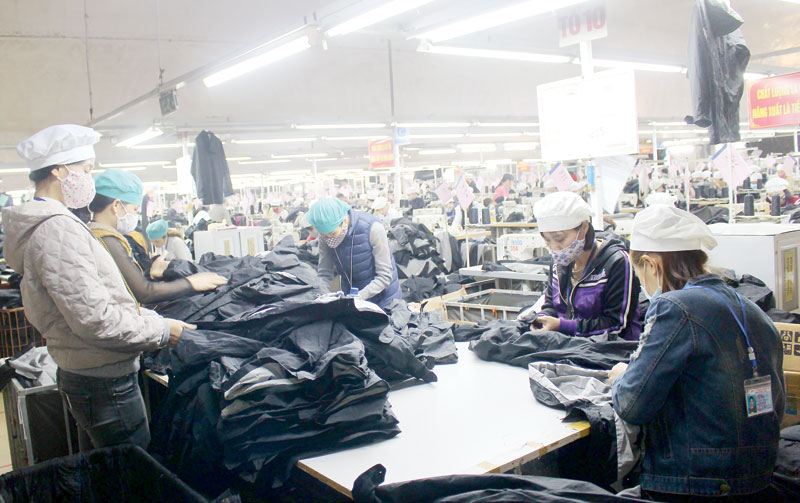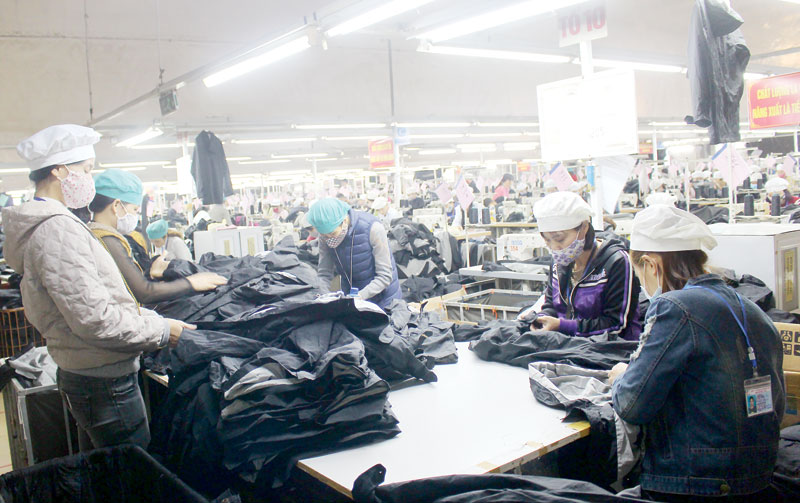
HBO - Hoa Binh newspaper has an exclusive interview with Pham Tien Dung, Director of the provincial Department of Industry and Trade, on the sector’s efforts to create a breakthrough in the province’s exports this year.

Viet-Han garment join stock company in Hoa Binh steps up production to
meet deadlines for orders from foreign partners.
Reporter: Could you please point
out advantages that will help Hoa Binh achieve its export targets set for 2019?
Mr. Pham Tien Dung: In 2018, Hoa Binh’s import-export turnover
exceeded 1.1 billion USD. Last year, the province focused on exporting
processed and manufactured products. Its export markets were expanded thanks to
opportunities brought about by new-generation free trade agreements. The local
business climate was improved significantly. The Comprehensive and Progressive
Agreement for Trans-Pacific Partnership (CPTPP) took effect in early 2019 and
the EU-Vietnam Free Trade Agreement (EVFTA) is expected to follow suit later
this year, creating a magnet for foreign direct investment and giving a boost
to production businesses.
Viet-Han garment join stock company in Hoa Binh steps up production to
meet deadlines for orders from foreign partners.
Reporter: What steps the industry and trade sector has taken to
kick-start the year?
Mr. Pham Tien Dung: Hoa Binh province plans to raise its
import-export value to over 1.4 billion USD this year, of which exports are
expected to contribute 790 million USD.
The province’s export earnings in
February reached 53.7 million USD, bringing the total amount in the first two
months of the year to 107.9 million USD, up 15.02 percent from the same period
last year and equivalent to 13.66 percent of the annual target. Key foreign
currency earners included electronic products, garments-textiles, metal and
compressed wood panels. Local firms are tending to invest more in improving product
quality to achieve sustainable export growth.
Reporter: What is the focus of the trade and industry sector this
year?
Mr. Pham Tien Dung: The trade and industry sector will focus on reforming
administrative procedures, attracting investment, stepping up the building and
development and registration of national trademarks and key export staples, and
implementing Vietnam’s international integration commitments. The sector will
also increase trade promotion activities and introduce agricultural products in
potential markets, capitalize on signed free trade agreements, and remove
hurdles to facilitate local enterprises and projects.
Reporter: Thank you!
According to data from the Hoa Binh Provincial Party Committee, the industrial production index for the first six months of 2025 is estimated to have increased by 20% compared to the same period last year. This marks the highest year-on-year growth rate for this period since 2020.
In the first six months of 2025, Hoa Binh province’s export turnover was estimated at 1.145 billion USD, marking an 18.11% increase compared to the same period in 2024. Import turnover was estimated at $ 804 million, a 17.15% increase, which helped the province maintain a positive trade balance.
The lives of the ethnic minority farmers in Tan Lac district have gradually improved thanks to the new directions in agricultural production. This is a testament to the collective strength fostered through the professional associations and groups implemented by various levels of the district’s Farmers’ Union.
With the motto the "product quality comes first,” after nearly one year of establishment and operation, Muong village’s Clean Food Agricultural and Commercial Cooperative, located in Cau Hamlet, Hung Son Commune (Kim Boi district), has launched reputable, high-quality agricultural products to the market that are well-received by consumers. The products such as Muong village’s pork sausage, salt-cured chicken, and salt-cured pork hocks have gradually carved out a place in the market and they are on the path to obtaining the OCOP certification.
In the past, the phrase "bumper harvest, rock-bottom prices" was a familiar refrain for Vietnamese farmers engaged in fragmented, small-scale agriculture. But today, a new spirit is emerging across rural areas of Hoa Binh province - one of collaboration, organisation, and collective economic models that provide a stable foundation for production.
Maintaining growing area codes and packing facility codes in accordance with regulations is a mandatory requirement for agricultural products to be eligible for export. Recently, the Department of Agriculture and Environment of Hoa Binh province has intensified technical supervision of designated farming areas and packing facilities to safeguard the "green passport" that enables its products to access international markets.



